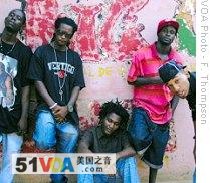Bissau
02 July 2009
Guinea-Bissau is a nation known around the world for political killings, drug trafficking and crippling poverty. As the country awaits the results of presidential elections held June 28, a group of young hip-hop artists are speaking out in their native Kriol language against the political violence they say eclipses the real identity of Guinea-Bissau.
 |
| Members of Guinea Bissau's hip hop scene come together under the banner of "Big Up GB" to produce a single speaking out against political violence during the country's presidential elections in June, 2009 |
Rap, politics and social commentary intertwine in the Big Up GB Mixtape, a song written and performed by young rappers in response to the lawlessness and political violence that have troubled the small West African nation since independence.
Emcee H is a soft-spoken young man with short dreadlocks that frame his face. A member of the hip-hop group, Baloberos, De Graca sings a verse on the mixtape, asking his fellow Guineans to sit and think about the men who have fallen, who have left their houses dark.
De Graca says the song talks about a history of abuse of power and killings in Guinea-Bissau politics. It is a call to attention and a call for help.
He says it is the first time hip-hop artists have come together to respond en masse to the political events occurring in the country.
Big Up GB began two years ago with the aim of uniting hip-hop groups across Guinea-Bissau to better promote their music.
Shivani Ahlowalia and Brian King, founders of the Guinea-Bissau music label Cobiana records, instigated the formation of the hip-hop collective. King says 16 groups are involved and all are welcome to join.
"We started pulling this together as a way to raise everybody's skill and reinforce each other and to promote Guinea-Bissau hip hop in general, rather than promote any single group," he said. "Then as we progressed a number of pretty horrible events happened including the assassination of the president, the killing of the armed forces chief and so on."
Three months later independent presidential candidate Baciro Dabo was shot to death in his bed. King says these events changed the direction of the project. Big Up GB's effort to unite rappers to promote hip hop soon became about the importance of unity in the country in the face of violence.
"After so much negative attention has been directed towards Guinea-Bissau, a collaboration emerged with a fair-trade hip-hop label in the United States called Nomadic Wax," added king. "And Nomadic Wax are the ones who asked if Big Up GB could pull together four or six rappers to rap their reactions to the most recent round of political killings ... And it has been a very inspiring collaboration for everybody."
King says music in Guinea Bissau is one of the primary vehicles for expressing national identity. During the recent elections, candidates enlisted popular artists to play at their rallies and sing campaign songs.
Absil, of the Bissauan hip hop group "Best Friends", raps about the origins of Guinea-Bissau's misfortune. He says it all began with the murder of the young revolutionary thinker and Father of the Nation Amilcar Cabral, who opposed the 'anything can go' attitudes of those in power.
Cabral was assassinated shortly before Guinea-Bissau won independence from Portugal in 1974.
Absil, with dreadlocks to his shoulders, wears jeans and a T-shirt and a mysterious key hanging from a chain around his neck. He says the recent murders trouble him because they can only bring more hate and a desire for vengeance.
Absil says he felt an obligation to record something and express his feelings about the situation through music. As rappers, he says, we have a responsibility to build and transform society. We turn what we hear on the street into music.
Absil still believes his music can make a difference, but it will only be one of the many things needed to bring change.
De Gracia and his partner As One wrote a song two years ago about the general situation in Guinea Bissau called, Things Are Not Right. Since then, he says nothing has changed. When his favourite candidate Baciro Dabo was murdered before the elections, he decided not to vote.
As well as responding to the recent killings, the Big Up GB hip-hop artists want to send a different message out to the world about Guinea-Bissau.
De Graca says the name of Guinea-Bissau is known in the world basically because of bad news. But there are lots of good things happening here. The world just is not interested in hearing about them.
Despite poverty and drug trafficking, De Graca says, there are people of great capability and creativity like those involved in the Big Up GB hip-hop movement.